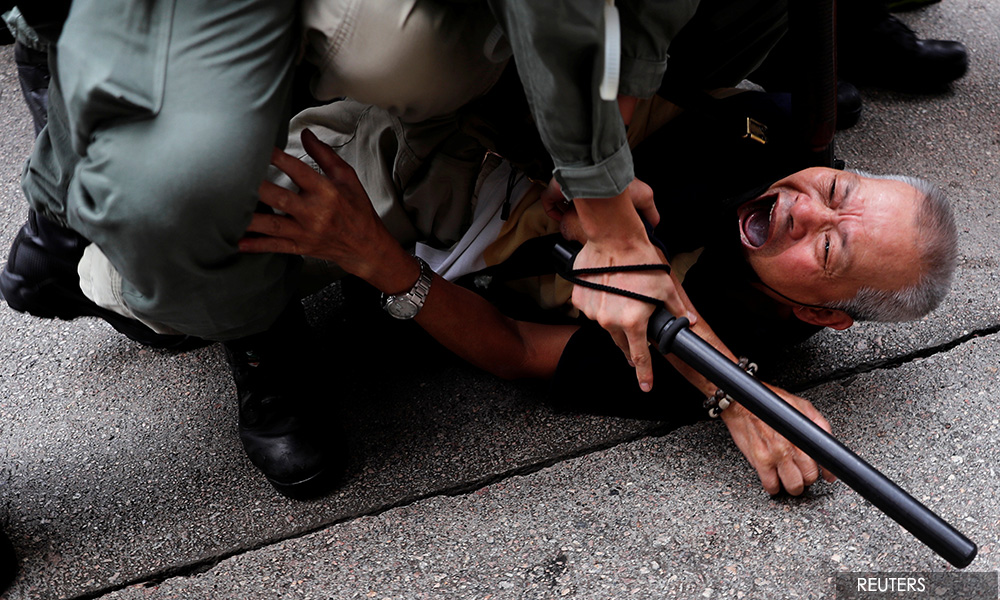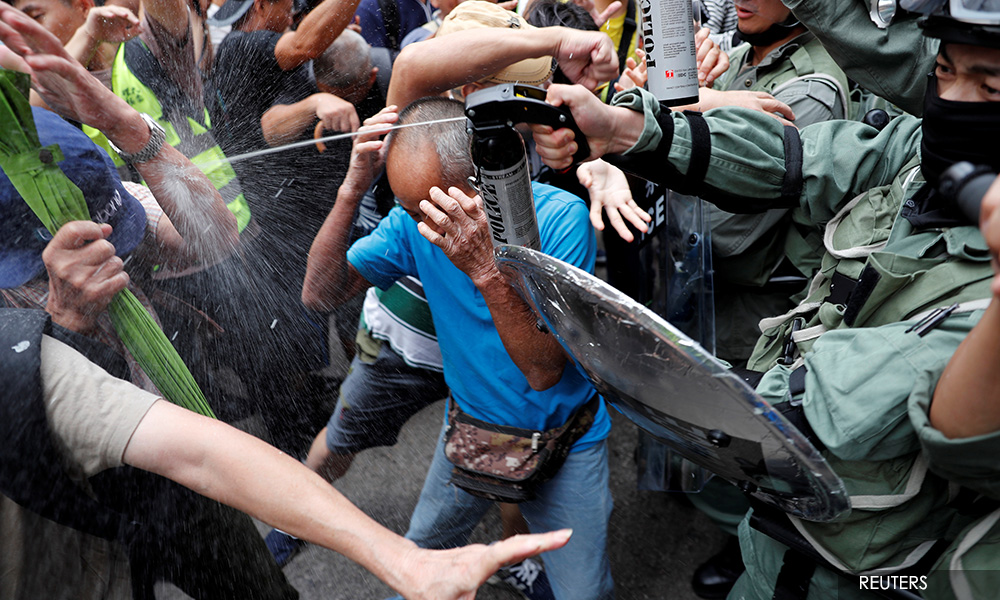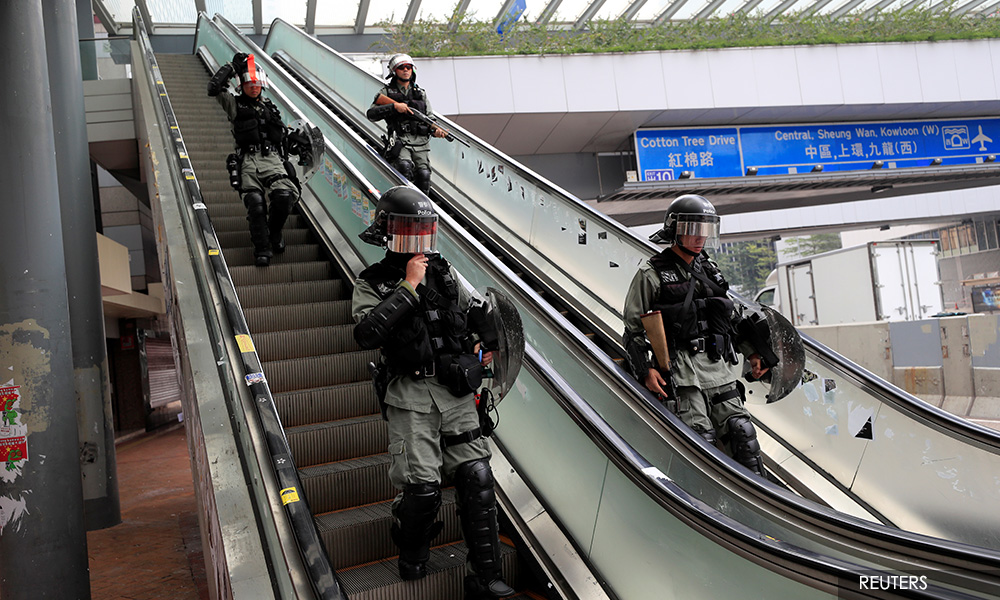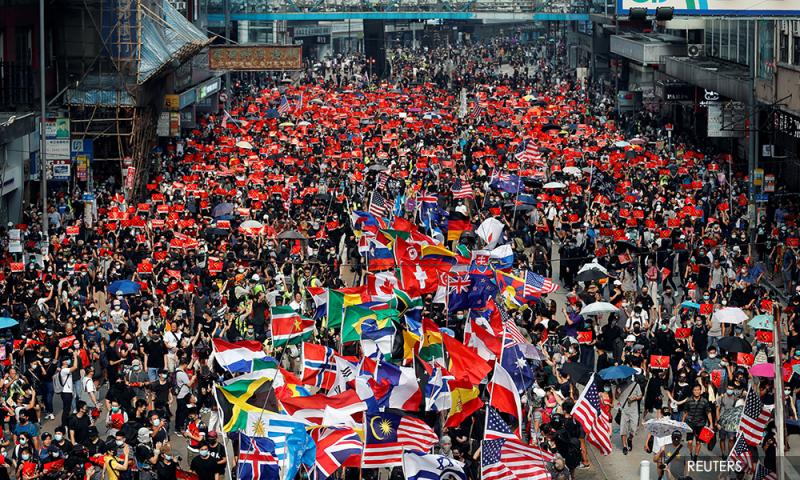Hong Kong leader to leave town despite sending invites for National Day party
Hong Kong police fired tear gas to break up pro-democracy protests on Sunday as the government announced that the city's leader Carrie Lam will be out of town for China's Oct 1 National Day, despite her sending out invitations for celebrations at home.
The clashes in the Causeway Bay shopping district followed another night of violent showdowns with police after weeks of pro-democracy unrest in the Chinese-ruled city.
Some shops closed ahead of expected demonstrations, while the MTR metro service shut stations, a move that has made it a target of violence in the past.
Protesters shouted anti-China slogans and called for their "five demands, not one less" of the government, including universal suffrage and the dropping of all charges against their arrested colleagues.
They later moved on to the Wan Chai entertainment district, where they daubed paint on the windows of shops seen as pro-Beijing, and were continuing west towards the Admiralty area of government offices.

About 200 China supporters dressed in red T-shirts gathered on top of Victoria Peak, overlooking the harbour, at around midday. They sang the Chinese national anthem and chanted “I love China”.
Angela, a housewife in her 40s, a Chinese flag sticker plastered on her cheek, said the pro-democracy protesters were “thugs”.
"If the government takes violent action, I don’t object,” she said. “We have tolerated enough. I think I have emotional problems because of the riots. Because it’s not safe to go out.”
Lam, the focus of weeks of anti-government unrest, will leave for Beijing on Monday to celebrate the 70th anniversary of the founding of the People's Republic the following day.
Lam, who was trapped in an indoor stadium by street protests for hours this week after an "open dialogue" with the people, will return to Hong Kong on Tuesday night overland, minimising the chances of a clash at the airport, a popular target of anti-government protests.
She had sent out invitations "requesting the pleasure of your company" at a flag-raising ceremony and National Day reception at the Convention and Exhibition Centre in Wan Chai on Tuesday.
It was not immediately clear why she had the change of heart, but the government said Chief Secretary for Administration Matthew Cheung Kin-chung would stand in for her.

Arthur, 40, wearing glasses and a mask covering the lower half of his face, said Lam’s trip was expected.
"In these three months, Carrie Lam has not really cared about the protesters. She only cares about the CCP (Chinese Communist Party) or what we might call ‘her boss’,” he said.
"I think Hong Kong is somehow at this moment the frontline between Western democracy and the dictatorship in China... Hong Kong looks more and more like a police state.”
One woman, who described herself as a "real Hong Konger", said she saw a conspiracy.
"So whatever happens, if the police fire with real bullets, she can avoid all the responsibility. So she can say whoever is in charge made a silly mistake."

Police fired tear gas and water cannon on Saturday night to disperse protesters who threw petrol bombs and rocks, broke government office windows and blocked a key road near the local headquarters of China's People's Liberation Army.
Anti-government protesters have attacked the legislature, Beijing's main Liaison Office, occupied the airport, thrown petrol bombs at police, vandalised metro stations and set street fires in the former British colony.
Police have responded with tear gas, water cannon, rubber bullets and occasional live rounds fired into the air.
The protesters are angry about what they see as creeping Chinese interference in Hong Kong, which returned to China in 1997 under a "one country, two systems" formula guaranteeing freedoms that are not enjoyed on the mainland.
China dismisses the accusation and has accused foreign governments, including the United States and Britain, of fanning anti-China sentiment.
Protests were sparked in June by planned legislation, since withdrawn, that would have allowed the extradition of suspected criminals to mainland China. But they have since expanded into a broader pro-democracy movement.
Rallies in support of the anti-gvernment protesters were held in Australia's largest cities, with the biggest in Sydney.
Many wore face masks to hide their identity and crowds yelled "Stand with Hong Kong" and "Fight for freedom", while placards depicted Chinese President Xi Jinping with a cross marked across his face.
- Reuters
RM12.50 / month
- Unlimited access to award-winning journalism
- Comment and share your opinions on all our articles
- Gift interesting stories to your friends
- Tax deductable

 Reuters
Reuters